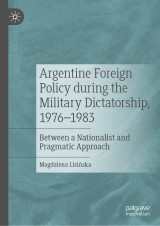Details

Argentine Foreign Policy during the Military Dictatorship, 1976-1983
Between a Nationalist and Pragmatic Approach|
80,24 € |
|
| Verlag: | Palgrave Macmillan |
| Format: | |
| Veröffentl.: | 09.01.2019 |
| ISBN/EAN: | 9783030062156 |
| Sprache: | englisch |
Dieses eBook enthält ein Wasserzeichen.
Beschreibungen
This book examines Argentine foreign policy under the military dictatorship from 1976–1983, also known as the National Reorganization Process. It brings together case studies on the most distinctive decisions and key issues in the regime’s foreign relations, including the international response to human rights violations, the dispute with Chile over the Beagle Channel, covert operations in Central America, the Argentine nuclear program, and the Falklands War. Lisińska examines the influence of ideological factors on foreign policy decisions, highlighting the relationship between the nationalism shaping the military’s policy goals and its pragmatic approach to achieving them.<br>
<p>1. Introduction</p><p>2. Pragmatic nationalism as the ideology of the dictatorship</p><p>3. Mechanisms and determinants of Argentine foreign policy under the military rule</p><p>4. Diplomacy on the multilateral level: human rights and the atomic program</p><p>5. The Beagle Channel territorial dispute with Chile </p><p>6. Covert military operations : the case of Central America</p>7. The Falklands dispute and the Argentine-British war<p></p><p>8. Final remarks.</p>
<b>Magdalena Lisińska</b> is Assistant Lecturer at the Institute of Political Science and International Relations of the Jagiellonian University in Poland. Her research focuses on Argentine politics and history, United States–Latin American relations, and security challenges in Latin America.
This book examines Argentine foreign policy under the military dictatorship from 1976–1973, also known as the National Reorganization Process. It brings together case studies on the most distinctive decisions and key issues in the regime’s foreign relations, including the international response to human rights violations, the dispute with Chile over the Beagle Channel, covert operations in Central America, the Argentine nuclear program, and the Falklands War. Lisińska examines the influence of ideological factors on foreign policy decisions, highlighting the relationship between the nationalism shaping the military’s policy goals and its pragmatic approach to achieving them.
<p>Offers the first comprehensive study of foreign policy in Argentina during the 1976–1983 military dictatorship</p><p>Focuses on the role of ideology in foreign policy decision-making</p><p>Appeals to scholars of international relations, Latin American history, and Latin American politics</p>
Diese Produkte könnten Sie auch interessieren:

The Last Samurai - Japanische Geschichtsdarstellung im populären Kinofilm

von: Daniel Scherrer

34,99 €















